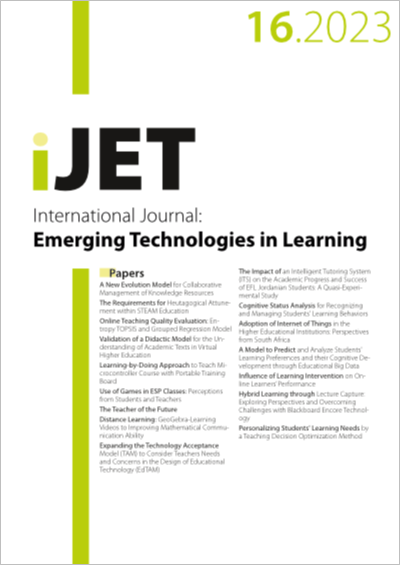Online Teaching Quality Evaluation: Entropy TOPSIS and Grouped Regression Model
DOI:
https://doi.org/10.3991/ijet.v18i16.41353Keywords:
Online teaching, Quality evaluation, Entropy TOPSIS, Grouped Regression ModelAbstract
With the continuous progress in Chinese higher education, the quality of online teaching has become the key to influencing that of the operation and reputation of universities and colleges. Nevertheless, the results of traditional teaching quality evaluation methods are considerably influenced by objectivity due to limitations in single-index and outdated methods. Hence, the construction of a reasonable online teaching quality evaluation model for universities and colleges presents important research significance to optimize the existing evaluation process. An online teaching quality evaluation index system for teachers at 26 observation points was set up from the perspectives of teaching objectives, process, and effect. The Technique for Order Preference by Similarity to Solution (TOPSIS) scores of 215 teachers from six universities in Henan Province, China, were evaluated using the entropy TOPSIS method. In addition, the significance of influencing factors in the ranking results of online teaching quality by teachers was analyzed using a hierarchical regression model. Results demonstrate that the weights of teaching attitude, teaching contents, and cognitive objectives were the highest and occupied the top three positions with weights of 14.94%, 12.99%, and 12.96%. By using three level-1 indexes of teaching objectives, process, and effect as the explanatory variables, students’ scores for teachers are all significant under the 1% level. According to the Chow test, the results are F (4, 207) = 2.725 and p = 0.031 < 0.05, indicating that using the online teaching duration of teachers as a grouping variable brings structural changes. Results can optimize online teaching quality evaluation and provide scientific references to evaluate the teaching quality of teachers.
Downloads
Published
How to Cite
Issue
Section
License
Copyright (c) 2023 Yan Zhang, Chang Liu

This work is licensed under a Creative Commons Attribution 4.0 International License.



